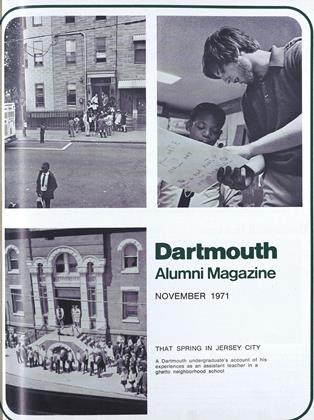AMERICANS AND CHINESE COMMUNISTS, 1927-1945: A PERSUADING ENCOUNTER.
NOVEMBER 1971 WILLARD PETERSONBy Kenneth E. Shewmaker (Assistant Professor of History).Ithaca and London: Cornell UniversityPress, 1971. 387 pp. $10.00.
Most "timely" books are the product of a journalistic rush to provide background for current headlines. Some, such as Professor Shewmaker's, are the results of years of painstaking scholarship which gain in pertinence because of an unexpected shift in the course of events.
In his well written analysis of American eye-witness reporting on Chinese Communists from 1936 to 1945, Shewmaker provides a perspective on what will be an increasing flow of dispatches from China in the 1970'5. Those especially who were shocked by the announcement of Nixon's visit to China will likewise be troubled by the favorable tenor of many of the reports from China. What are we to make of the enthusiasm of such disparate visitors to China as the ping-pong team and James Reston? How can the nation still being portrayed as America's most menacing enemy in arguments for military appropriations be the site of charming photographs in Life? We are just now coming out of a situation analogous to 1936, when "Every, thing that had been written on the subject [of Chinese Communists] could be categorized as 'propaganda, special pleading, guesswork or hearsay'." Like today, some of the rapture in the reports from Communist areas in the 1930's stems from the visitors' brief exposure to a society which for several years previously had been grossly caricatured by hostile conjecture; the daylight could never match the nightmare.
Shewmaker's book gives us some assurance that Americans reporting from China are not and will not be all either "dupes" or covert Communist agents. His book will even serve as a useful guide to the blind spots of American observers, who can be expected generally to be as unmindful of the implications of ideological commitments as they will be sympathetic to the egalitarian- ism, order, and frontier fervor in the new China. As in the 1930's, the discovery today that Chinese Communists are human beings can in itself have heady effects. Shewmaker properly emphasizes the "skill of the Communists in presenting their case,'' and shows Chou En-lai to have been as charismatic then as now. He stresses the favorable publicity accorded the Communists by their being compared to Chiang Kai-shek's regime, as is still the case. Finally, the book has a cautionary function by exposing the ill-founded attempts in the 1950's to inculpate reporters in the so-called "loss" of China; let us hope that observers now traveling to China will not be similarly abused.
What Shewmaker underplays in his book, and what we all shall be called upon to judge as we read the dispatches coming from the People's Republic, is the relationship between the reports and their realities. It must be at least possible that the Persuading Encounter of the 1930's, and the 1970's, is not simply the result of inspired p.r., naivete, or ugly comparisons. We cannot neglect the possibility that reporters and other observers might respond positively to a situation because of its merits in human terms.
Mr. Peterson, an Assistant Professor atPrinceton University, teaches Chinese intellectual history.
 View Full Issue
View Full Issue
More From This Issue
-
 Feature
FeatureThat Spring in Jersey City
November 1971 By BRUCE ALAN KIMBALL '73 -
 Feature
FeatureThe View from Oxford
November 1971 By Sanford B. Ferguson '70 -
 Feature
FeatureThe President's Convocation Address
November 1971 -
 Feature
FeatureEngineering in the Limelight
November 1971 -
 Article
ArticleBig Green Teams
November 1971 By JACK DEGANGH -
 Article
ArticleFaculty
November 1971 By ROBERT B. GRAHAM '40
Books
-
 Books
BooksNEVER SAY DIET.
November 1954 By ALBERT I. DICKERSON '30 -
 Books
BooksPROBLEMS IN INCOME TAX FUNDAMENTALS.
October 1937 By C. W. Sargent '15 -
 Books
BooksCUENTOS DE MAGON.
APRIL 1970 By FLORENCE L. YUDIN -
 Books
BooksLINE OF DEPARTURE,
February 1948 By Herbert F. West '22. -
 Books
BooksTHE AMERICAN PRINCESS.
OCTOBER 1971 By KATHERINE LEVER -
 Books
BooksFAT MUTTON AND LIBERTY OF CONSCIENCE: SOCIETY IN RHODE ISLAND, 1636-1690.
February 1975 By LOUISE RIEGEL

